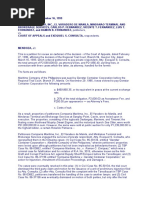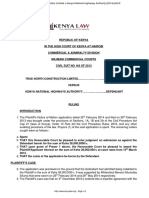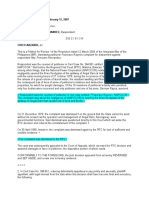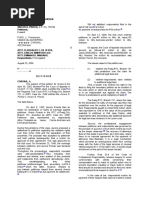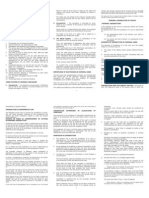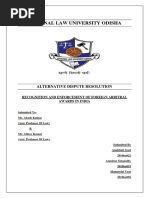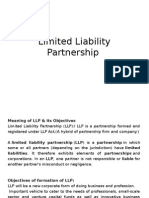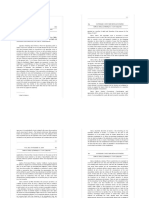Atty. Mangontawar M. Gubat, Petitioner, vs. National Power Corporation, Respondent. Decision
Atty. Mangontawar M. Gubat, Petitioner, vs. National Power Corporation, Respondent. Decision
Uploaded by
J Castillo MejicaCopyright:
Available Formats
Atty. Mangontawar M. Gubat, Petitioner, vs. National Power Corporation, Respondent. Decision
Atty. Mangontawar M. Gubat, Petitioner, vs. National Power Corporation, Respondent. Decision
Uploaded by
J Castillo MejicaOriginal Title
Copyright
Available Formats
Share this document
Did you find this document useful?
Is this content inappropriate?
Copyright:
Available Formats
Atty. Mangontawar M. Gubat, Petitioner, vs. National Power Corporation, Respondent. Decision
Atty. Mangontawar M. Gubat, Petitioner, vs. National Power Corporation, Respondent. Decision
Uploaded by
J Castillo MejicaCopyright:
Available Formats
[G.R. No.
167415 : February 26, 2010]
ATTY. MANGONTAWAR M. GUBAT,
PETITIONER, VS. NATIONAL
POWER CORPORATION,
RESPONDENT. : FEBRUARY 2010 -
PHILIPPINE SUPREME COURT
JURISPRUDENCE - CHANROBLES
VIRTUAL LAW LIBRARY
ATTY. MANGONTAWAR M. GUBAT, PETITIONER, VS. NATIONAL
POWER CORPORATION, RESPONDENT.
DECISION
Truly, there is no doubt that the rights of others cannot be prejudiced by
private agreements. However, before this Court can act and decide to
protect the one apparently prejudiced, we should remember what Aesop
taught in one of his fables: Every truth has two sides; it is well to look at
both, before we commit ourselves to either.
A lawyer asserts his right to his contingent fees after his clients, allegedly
behind his back, had entered into an out-of-court settlement with the National
Power Corporation (NPC). The trial court granted his claim by way of
http://www.chanrobles.com/cralaw/2010februarydecisions.php?id=1278 22/10/2017, 6A01 PM
Page 1 of 22
summary judgment. However, this was reversed by the Court of Appeals (CA)
because the counsel was allegedly enforcing a decision that was already
vacated. In this petition, petitioner Atty. Mangontawar M. Gubat (Atty. Gubat)
attempts to persuade us that the compensation due him is independent of the
vacated decision, his entitlement thereto being based on another reason: the bad
faith of his clients and of the respondent NPC.
Factual Antecedents
In August 1990, plaintiffs Ala Mambuay, Norma Maba, and Acur Macarampat
separately filed civil suits for damages against the NPC before the Regional
Trial Court of Lanao del Sur in Marawi City (RTC), respectively docketed as
Civil Case Nos. 294-90, 295-90, and 296-90. In the said complaint, plaintiffs
were represented by Atty. Linang Mandangan (Atty. Mandangan) and petitioner
herein, whose services were engaged at an agreed attorney's fees of P30,000.00
for each case and P600.00 for every appearance. Petitioner was the one who
signed the complaints on behalf of himself and Atty. Mandangan.[1]
During the course of the proceedings, the three complaints were consolidated
because the plaintiffs' causes of action are similar. They all arose from NPC's
refusal to pay the amounts demanded by the plaintiffs for the cost of the
improvements on their respective lands which were destroyed when the NPC
constructed the Marawi-Malabang Transmission Line.
On the day of the initial hearing on the merits, NPC and its counsel failed to
appear. Consequently, respondent was declared in default. Despite the plea of
NPC for the lifting of the default order, the RTC of Marawi City, Branch 8,
rendered its Decision[2] on April 24, 1991, the dispositive portion of which
provides:
http://www.chanrobles.com/cralaw/2010februarydecisions.php?id=1278 22/10/2017, 6A01 PM
Page 2 of 22
PREMISES CONSIDERED, judgment is hereby rendered in favor of the
herein plaintiffs and against the defendant National Power Corporation as
represented by its President Ernesto Aboitiz, P.M. Durias and Rodrigo P.
Falcon, ordering the latter jointly and severally:
(1) In Civil Case No. 204-90 to pay plaintiff Ala Mambuay the sum of
P103,000.00 representing the value of the improvements and the occupied
portion of the land, P32,000.00 as attorney's fees, P20,000.00 as moral
and/or exemplary damages, P50,000.00 as actual damages and the costs;
(2) In Civil Case No. 295-90 to pay plaintiff Norma Maba represented by
Capt. Ali B. Hadji Ali the sum of P146,700.00 representing the value of the
improvements and the occupied portion of the land, P32,000.00 as
attorney's fees, P20,000.00 as moral and/or exemplary damages, P50,000.00
as actual damages and the costs;
(3) In Civil Case No. 296-90 to pay plaintiff Acur Macarampat the sum of
P94,100.00 representing the value of the improvements and the occupied
portion of the land, P32,000.00 as attorney's fees, P20,000.00 as moral
and/or exemplary damages, P50,000.00 as actual damages and the costs.[3]
NPC appealed to the CA which was docketed as CA-G.R. CV No. 33000.
During the pendency of the appeal, Atty. Gubat filed an Entry and Notice of
Charging Lien[4] to impose his attorney's lien of P30,000.00 and appearance
fees of P2,000.00 on each of the three civil cases he handled, totalling
P96,000.00.
http://www.chanrobles.com/cralaw/2010februarydecisions.php?id=1278 22/10/2017, 6A01 PM
Page 3 of 22
On August 19, 1992, NPC moved to dismiss its appeal[5] alleging that the
parties had arrived at a settlement. Attached to the motion were
acknowledgment receipts[6] dated April 2, 1992 signed by plaintiffs Acur
Macarampat, Ala Mambuay, and Norma Maba, who received P90,060.00,
P90,000.00, and P90,050.00 respectively, in full satisfaction of their claims
against the NPC. The motion stated that copies were furnished to Atty.
Mandangan and herein petitioner,
although it was only Atty. Mandangan's signature which appeared therein.[7]
On January 24, 1996, the CA rendered its Decision[8] disposing thus:
WHEREFORE, the Order of Default dated December 11, 1990; the Order
denying the Motion for Reconsideration to Lift Order of Default dated
January 25, 1991; and the Decision dated April 24, 1991, are hereby
ANNULLED and SET ASIDE and the records of Civil Case Nos. 294-90,
295-90 and 296-90 are hereby ordered remanded to the court of origin for
new trial.[9]
After the cases were remanded to the RTC, petitioner filed a Motion for Partial
Summary Judgment[10] on his attorney's fees. He claimed that the plaintiffs and
the NPC deliberately did not inform him about the execution of the
compromise agreement, and that said parties connived with each other in
entering into the compromise agreement in order to unjustly deprive him of his
attorney's fees. Furthermore, he alleged:
xxxx
http://www.chanrobles.com/cralaw/2010februarydecisions.php?id=1278 22/10/2017, 6A01 PM
Page 4 of 22
12. That, in view of such settlement, there are no more genuine issues
between the parties in the above-entitled cases except as to the attorney's
fees; As such, this Honorable Court may validly render a partial summary
judgment on the claim for attorney's fees; and
13. That the undersigned counsel hereby MOVES for a partial summary
judgment on his lawful attorney's fees based on the pleadings and
documents on file with the records of this case.[11]
xxxx
Petitioner thus prayed that a partial summary judgment be rendered on his
attorney's fess and that NPC be ordered to pay him directly his lawful attorney's
fees of P32,000.00 in each of the above cases, for a total of P96,000.00.
NPC opposed the motion for partial summary of judgment. It alleged that a
client may compromise a suit without the intervention of the lawyer and that
petitioner's claim for attorney's fees should be made against the plaintiffs. NPC
likewise claimed that it settled the case in good faith and that plaintiffs were
paid in full satisfaction of their claims which included attorney's fees.
On March 15, 2000, the trial court issued an Order[12] granting petitioner's
motion for summary judgment. It found that the parties to the compromise
agreement connived to petitioner's prejudice which amounts to a violation of
the provisions of the Civil Code on Human Relations.[13] It ruled that:
xxxx
http://www.chanrobles.com/cralaw/2010februarydecisions.php?id=1278 22/10/2017, 6A01 PM
Page 5 of 22
There is no dispute that the Compromise Agreement was executed during
the pendency of these cases with the Honorable Court of Appeals. Despite
the knowledge of the defendant that the services of the movant was on a
contingent basis, defendant proceeded with the Compromise Agreement
without the knowledge of Atty. Gubat. The actuation of the defendant is
fraudulently designed to deprive the movant of his lawful attorney's fees
which was earlier determined and awarded by the Court. Had defendant
been in good faith in terminating these cases, Atty. Gubat could have been
easily contacted.
x x x x[14]
The dispositive portion of the Order reads:
WHEREFORE, premises considered, plaintiffs Ala Mambuay, Norma
Maba and Acur Macarampat as well as defendant National Power
Corporation are hereby ordered to pay jointly and solidarily Atty.
Mangontawar M. Gubat the sum of P96,000.00.[15]
NPC filed a Motion for Reconsideration[16] but the motion was denied by the
trial court in its June 27, 2000 Order.[17] Thus, NPC filed a Petition for
Certiorari[18] before the CA docketed as CA-G.R. SP No. 60722, imputing
grave abuse of discretion on the court a quo for granting petitioner's Motion for
Partial Summary Judgment. It prayed that the subject order be set aside insofar
as NPC is concerned.
http://www.chanrobles.com/cralaw/2010februarydecisions.php?id=1278 22/10/2017, 6A01 PM
Page 6 of 22
NPC maintained that it acted in good faith in the execution of the compromise
settlement. It likewise averred that the lower court's award of attorney's fees
amounting to P96,000.00 was clearly based on the award of attorney's fees in
the April 24, 1991 Decision of the trial court which had already been reversed
and set aside by the CA in CA-G.R. CV No. 33000. Moreover, NPC contended
that petitioner cannot enforce his charging lien because it presupposes that he
has secured a favorable money judgment for his clients. At any rate, since
petitioner is obviously pursuing the compensation for the services he rendered
to his clients, thus, recourse should only be against them, the payment being
their personal obligation and not of respondent. NPC further alleged that even
assuming that the subject attorney's fees are those that fall under Article 2208
of the Civil Code[19] which is in the concept of indemnity for damages to be
paid to the winning party in a litigation, such fees belong to the clients and not
to the lawyer, and this form of damages has already been paid directly to the
plaintiffs.
On the other hand, petitioner claimed that he was not informed of the
compromise agreement or furnished a copy of NPC's Motion to Dismiss
Appeal. He alleged that the same was received only by Atty. Mandangan who
neither signed any of the pleadings nor appeared in any of the hearings before
the RTC. Petitioner clarified that his motion for a partial summary judgment
was neither a request for the revival of the vacated April 24, 1991 Decision nor
an enforcement of the lien, but a grant of his contingent fees by the trial court
as indemnity for damages resulting from the fraudulent act of NPC and of his
clients who conspired to deprive him of the fees due him. He asserted that NPC
cannot claim good faith because it knew of the existence of his charging lien
when it entered into a compromise with the plaintiffs.
http://www.chanrobles.com/cralaw/2010februarydecisions.php?id=1278 22/10/2017, 6A01 PM
Page 7 of 22
Petitioner also alleged that NPC's remedy should have been an ordinary appeal
and not a petition for certiorari because the compromise agreement had settled
the civil suits. Thus, when the trial court granted the motion for partial
summary judgment on his fees, it was a final disposition of the entire case. He
also argued that the issue of bad faith is factual which cannot be a subject of a
certiorari petition. He also insisted that NPC's petition was defective for lack
of a board resolution authorizing Special Attorney Comie Doromal (Atty.
Doromal) of the Office of the Solicitor General (OSG) to sign on NPC's behalf.
On September 9, 2002, the CA rendered the herein assailed Decision[20] ruling
that:
The reasoning of Atty. Gubat is a `crude palusot' (a sneaky fallacious
reasoning) for how can one enforce a part of a decision which has been
declared void and vacated. In legal contemplation, there is no more decision
because, precisely, the case was remanded to the court a quo for further
proceeding.
It was bad enough that Atty. Gubat tried to pull a fast [one] but it was
[worse] that respondent Judge fell for it resulting in a plainly erroneous
resolution.
Like his predecessor Judge Adiong, Judge Macarambon committed basic
errors unquestionably rising to the level of grave abuse of discretion
amounting to lack or excess of jurisdiction.
WHEREFORE, finding merit in the petition, the Court issues the writ of
certiorari and strikes down as void the Order dated March 15, 2000 granting
http://www.chanrobles.com/cralaw/2010februarydecisions.php?id=1278 22/10/2017, 6A01 PM
Page 8 of 22
Atty. Mangontawar M. Gubat's Motion for Partial Summary Judgment as
well as the Order dated June 27, 2000 denying petitioner National Power
Corporation's Motion for Reconsideration.
SO ORDERED.[21]
Petitioner filed a motion for reconsideration but the motion was denied by the
CA in its January 19, 2005 Resolution,[22] Hence, this petition.
Petitioner insists on the propriety of the trial court's order of summary
judgment on his attorney's fees. At the same time, he imputes grave abuse of
discretion amounting to lack or excess of jurisdiction on the CA for
entertaining respondent's Petition for Certiorari. He maintains that the petition
should have been dismissed outright for being the wrong mode of appeal.
Our Ruling
The petition lacks merit.
Petitioner's resort to Rule 65 is not proper.
At the outset, the petition should have been dismissed outright because
petitioner resorted to the wrong mode of appeal by filing the instant petition for
certiorari under Rule 65. Section 1 of the said Rule explicitly provides that a
petition for certiorari is available only when there is no appeal or any plain,
speedy, and adequate remedy in the ordinary course of law. In this case, the
remedy of appeal by way of a petition for review on certiorari under Rule 45 is
not only available but also the proper mode of appeal. For all intents and
purposes, we find that petitioner filed the instant petition for certiorari under
http://www.chanrobles.com/cralaw/2010februarydecisions.php?id=1278 22/10/2017, 6A01 PM
Page 9 of 22
Rule 65 as a substitute for a lost appeal. We note that petitioner received a copy
of the January 19, 2005 Resolution of the CA denying his motion for
reconsideration on January 28, 2005. Under Section 2 of Rule 45, petitioner has
15 days from notice of the said Resolution within which to file his petition for
review on certiorari. As such, he should have filed his appeal on or before
February 12, 2005. However, records show that the petition was posted on
March 1, 2005, or long after the period to file the appeal has lapsed.
At any rate, even if we treat the instant petition as one filed under Rule 45, the
same should still be denied for failure on the part of the petitioner to show that
the CA committed a reversible error warranting the exercise of our
discretionary appellate jurisdiction.
Petitioner's resort to summary judgment
is not proper; he is not entitled to an immediate
relief as a matter of law, for the existence of bad
faith is a genuine issue of fact to be tried.
A summary judgment is allowed only if, after hearing, the court finds that
except as to the amount of damages, the pleadings, affidavits, depositions and
admissions show no genuine issue as to any material fact and that the movant is
entitled to a judgment as a matter of law.[23] The purpose of a summary
judgment is to avoid drawn out litigations and useless delays because the facts
appear undisputed to the mind of the court. Such judgment is generally based
on the facts proven summarily by affidavits, depositions, pleadings, or
admissions of the parties.[24] For a full-blown trial to be dispensed with, the
party who moves for summary judgment has the burden of demonstrating
clearly the absence of genuine issues of fact, or that the issue posed is patently
insubstantial as to constitute a genuine issue.[25] "Genuine issue" means an
http://www.chanrobles.com/cralaw/2010februarydecisions.php?id=1278 22/10/2017, 6A01 PM
Page 10 of 22
issue of fact which calls for the presentation of evidence as distinguished from
an issue which is fictitious or contrived.[26]
Petitioner pleaded for a summary judgment on his fees on the claim that the
parties intentionally did not inform him of the settlement. He alleged that he
never received a copy of NPC's Motion to Withdraw Appeal before the CA and
that instead, it was another lawyer who was furnished and who acknowledged
receipt of the motion. When he confronted his clients, he was allegedly told
that the NPC deceived them into believing that what they received was only a
partial payment exclusive of the attorney's fees. NPC contested these
averments. It claimed good faith in the execution of the compromise
agreement. It stressed that the attorney's fees were already deemed included in
the monetary consideration given to the plaintiffs for the compromise.
The above averments clearly pose factual issues which make the rendition of
summary judgment not proper. Bad faith imports a dishonest purpose or some
moral obliquity and conscious doing of a wrong. It is synonymous with fraud,
in that it involves a design to mislead or deceive another.[27] The trial court
should have exercised prudence by requiring the presentation of evidence in a
formal trial to determine the veracity of the parties' respective assertions.
Whether NPC and the plaintiffs connived and acted in bad faith is a question of
fact and is evidentiary. Bad faith has to be established by the claimant with
clear and convincing evidence, and this necessitates an examination of the
evidence of all the parties. As certain facts pleaded were being contested by the
opposing parties, such would not warrant a rendition of summary judgment.
Moreover, the validity or the correct interpretation of the alleged compromise
agreements is still in issue in view of the diverse interpretations of the parties
thereto. In fact, in the Decision of the CA dated January 24, 1996, the appellate
http://www.chanrobles.com/cralaw/2010februarydecisions.php?id=1278 22/10/2017, 6A01 PM
Page 11 of 22
court ordered the case to be remanded to the trial court for new trial, thereby
ignoring completely NPC's motion to dismiss appeal based on the alleged
compromise agreements it executed with the plaintiffs. Even in its assailed
Decision of September 9, 2002, the CA did not rule on the validity of the
alleged compromise agreements. This is only to be expected in view of its
earlier ruling dated January 24, 1996 which directed the remand of the case to
the court of origin for new trial.
Considering the above disquisition, there is still a factual issue on whether the
NPC and the plaintiffs had already validly entered into a compromise
agreement. Clearly, the NPC and the plaintiffs have diverse interpretations as
regards the stipulations of the compromise agreement which must be resolved.
According to the NPC, the amounts it paid to the plaintiffs were in full
satisfaction of their claims. Plaintiffs claim otherwise. They insist that the
amounts they received were exclusive of attorney's claim. They also assert that
NPC undertook to pay the said attorney's fees to herein petitioner.
A client may enter into a compromise
agreement without the intervention of
the lawyer, but the terms of the agreement
should not deprive the counsel of his
compensation for the professional services
he had rendered. If so, the compromise shall
be subjected to said fees. If the client and the
adverse party who assented to the compromise
are found to have intentionally deprived the
lawyer of his fees, the terms of the compromise,
insofar as they prejudice the lawyer, will be set
aside, making both parties accountable to pay
http://www.chanrobles.com/cralaw/2010februarydecisions.php?id=1278 22/10/2017, 6A01 PM
Page 12 of 22
the lawyer's fees. But in all cases, it is the client
who is bound to pay his lawyer for his legal
representation.
A compromise is a contract whereby the parties, by making reciprocal
concessions, avoid litigation or put an end to one already commenced.[28] It is a
consensual contract, binding upon the signatories/privies, and it has the effect
of res judicata.[29] This cannot however affect third persons who are not parties
to the agreement.[30]
Contrary to petitioner's contention, a client has an undoubted right to settle a
suit without the intervention of his lawyer,[31] for he is generally conceded to
have the exclusive control over the subject-matter of the litigation and may, at
any time before judgment, if acting in good faith, compromise, settle, and
adjust his cause of action out of court without his attorney's intervention,
knowledge, or consent, even though he has agreed with his attorney not to do
so.[32] Hence, a claim for attorney's fees does not void the compromise
agreement and is no obstacle to a court approval.[33]
However, counsel is not without remedy. As the validity of a compromise
agreement cannot be prejudiced, so should not be the payment of a lawyer's
adequate and reasonable compensation for his services should the suit end by
reason of the settlement. The terms of the compromise subscribed to by the
client should not be such that will amount to an entire deprivation of his
lawyer's fees, especially when the contract is on a contingent fee basis. In this
sense, the compromise settlement cannot bind the lawyer as a third party. A
lawyer is as much entitled to judicial protection against injustice or imposition
of fraud on the part of his client as the client is against abuse on the part of his
counsel. The duty of the court is not only to ensure that a lawyer acts in a
http://www.chanrobles.com/cralaw/2010februarydecisions.php?id=1278 22/10/2017, 6A01 PM
Page 13 of 22
proper and lawful manner, but also to see to it that a lawyer is paid his just fees.
[34]
Even if the compensation of a counsel is dependent only upon winning a case
he himself secured for his client, the subsequent withdrawal of the case on the
client's own volition should never completely deprive counsel of any legitimate
compensation for his professional services.[35] In all cases, a client is bound to
pay his lawyer for his services. The determination of bad faith only becomes
significant and relevant if the adverse party will likewise be held liable in
shouldering the attorney's fees.[36]
Petitioner's compensation is a personal obligation of his clients who have
benefited from his legal services prior to their execution of the compromise
agreement. This is strictly a contract between them. NPC would only be made
liable if it was shown that it has connived with the petitioner's clients or acted
in bad faith in the execution of the compromise agreement for the purpose of
depriving petitioner of his lawful claims for attorney's fees. In each case, NPC
should be held solidarily liable for the payment of the counsel's compensation.
However, as we have already discussed, petitioner's resort to summary
judgment is not proper. Besides, it is interesting to note that petitioner is the
only one claiming for his attorney's fees notwithstanding that plaintiffs'
counsels of record were petitioner herein and Atty. Mandangan. Nevertheless,
this is not at issue here. As we have previously discussed, this is for the trial
court to resolve.
The CA soundly exercised its discretion in
resorting to a liberal application of the rules.
There are no vested right to technicalities.
http://www.chanrobles.com/cralaw/2010februarydecisions.php?id=1278 22/10/2017, 6A01 PM
Page 14 of 22
Concededly, the NPC may have pursued the wrong remedy when it filed a
petition for certiorari instead of an appeal since the ruling on attorney's fees is
already a ruling on the merits. However, we find that the trial court gravely
abused its discretion amounting to lack or excess of jurisdiction when it
ordered NPC solidarily liable with the plaintiffs for the payment of the
attorney's fees. The rule that a petition for certiorari is dismissible when the
mode of appeal is available admits of exceptions, to wit: (a) when the writs
issued are null; and, (b) when the questioned order amounts to an oppressive
exercise of judicial authority.[37] Clearly, respondent has shown its entitlement
to the exceptions.
The same liberal application should also apply to the question of the alleged
lack of authority of Atty. Doromal to execute the certification of non-forum
shopping for lack of a board resolution from the NPC. True, only individuals
vested with authority by a valid board resolution may sign the certificate of
non-forum shopping in behalf of the corporation, and proof of such authority
must be attached to the petition,[38] the failure of which will be sufficient cause
for dismissal. Nevertheless, it cannot be said that Atty. Doromal does not enjoy
the presumption that he is authorized to represent respondent in filing the
Petition for Certiorari before the CA. As Special Attorney, he is one of the
counsels of NPC in the proceedings before the trial court, and the NPC never
questioned his authority to sign the petition for its behalf.
In any case, the substantive issues we have already discussed are justifiable
reasons to relax the rules of procedure. We cannot allow a patently wrong
judgment to be implemented because of technical lapses. This ratiocination is
in keeping with the policy to secure a just, speedy and inexpensive disposition
of every action or proceeding.[39] As we have explained in Alonso v. Villamor:
[40]
http://www.chanrobles.com/cralaw/2010februarydecisions.php?id=1278 22/10/2017, 6A01 PM
Page 15 of 22
There is nothing sacred about processes or pleadings, their forms or
contents. Their sole purpose is to facilitate the application of justice to the
rival claims of contending parties. They were created, not to hinder and
delay, but to facilitate and promote, the administration of justice. They do
not constitute the thing itself, which courts are always striving to secure to
litigants. They are designed as the means best adopted to obtain that thing.
In other words, they are a means to an end. When they lose the character of
the one and become the other, the administration of justice is at fault and
courts are correspondingly remiss in the performance of their obvious duty.
The error in this case is purely technical. To take advantage of it for other
purposes than to cure it, does not appeal to a fair sense of justice. Its
presentation as fatal to the plaintiff's case smacks of skill rather than right.
A litigation is not a game of technicalities in which one more deeply
schooled and skilled in the subtle art of movement and position, entraps and
destroys the other. It is rather, a contest in which each contending party
fully and fairly lays before the court the facts in issue and then, brushing
aside as wholly trivial and indecisive all imperfections of form and
technicalities of procedure, asks that justice be done upon the merits. Law-
suits, unlike duels, are not to be won by a rapier's thrust. Technicality, when
it deserts its proper office as an aid to justice and becomes its great
hindrance and chief enemy, deserves scant consideration from courts. There
should be no vested rights in technicalities. No litigant should be permitted
to challenge a record of a court of these Islands for defect of form when his
substantial rights have not been prejudiced thereby.
WHEREFORE, the Petition is hereby DISMISSED for lack of merit. The
http://www.chanrobles.com/cralaw/2010februarydecisions.php?id=1278 22/10/2017, 6A01 PM
Page 16 of 22
September 9, 2002 Decision of the Court of Appeals and its January 19, 2005
Resolution are AFFIRMED.
SO ORDERED.
Carpio, (Chairperson), Brion, Abad, and Perez, JJ., concur.
Endnotes:
[1]
Rollo, pp. 132, 135, and 138.
[2] CA rollo, pp. 48-56; penned by Judge Santos B. Adiong.
[3]
Id. at 55.
[4]
Rollo, p. 34.
[5]
Id. at 38-40.
[6]
Id. at 35-37. Except as to the amount, name of plaintiff, and the Civil
Case No., the Acknowledgment Receipts signed by each plaintiff were
similarly worded in this manner:
This is to acknowledge receipt from the NATIONAL POWER
CORPORATION (NPC) the sum of (amount) as full and complete
settlement of the cases entitled in (name of case) in (civil case no.) which is
now pending appeal before the Court of Appeals.
With the execution of this Acknowledgment Receipt, it is understood that I
http://www.chanrobles.com/cralaw/2010februarydecisions.php?id=1278 22/10/2017, 6A01 PM
Page 17 of 22
and my heirs and assigns have no further claim against NPC with respect to
the damage to improvements over my parcel of land which was affected by
the 69 KV Transmission Line.
Iligan City, Philippines, 2 April 1992.
Sgd.
(name of claimant)
Representing NPC:
(Sgd.)
CANDIDATO RAMOS
(Sgd.)
ATTY. ARTHUR L. ABUNDIENTE
Counsel for Defendant-NPC
[7]
Id. at 40.
[8]
CA rollo, pp 62-73; penned by Associate Justice Cancio C. Garcia and
concurred in by Associate Justices Eugenio S. Labitoria and Portia Aliño-
Hormachuelos.
[9]
Id. at 72.
[10]
Id. at 74-77.
[11]
Id. at 76.
[12] Id. at 81-82; penned by Acting Presiding Judge Moslemen T.
http://www.chanrobles.com/cralaw/2010februarydecisions.php?id=1278 22/10/2017, 6A01 PM
Page 18 of 22
Macarambon.
[13]
Article 19. Every person must, in the exercise of his rights and in the
performance of his duties, act with justice, give everyone his due, and
observe honesty and good faith.
Article 20. Every person who, contrary to law, willfully or negligently
causes damage to another, shall indemnify the latter for the same.
Article 21. Any person who willfully causes loss or injury to another in a
manner that is contrary to morals, good customs or public policy shall
compensate the latter for the damage.
[14]
CA rollo, pp. 81-82.
[15]
Id. at 82.
[16]
Id. at 83-86.
[17]
Id. at 87; penned by Judge Santos B. Adiong.
[18] Id. at 2-24.
[19]
In the absence of stipulation, attorney's fees and expenses of litigation,
other than judicial costs, cannot be recovered, except:
(1) When exemplary damages are awarded;
(2) When the defendant's act or omission has compelled the plaintiff to
litigate with third persons or to incur expenses to protect his interest;
http://www.chanrobles.com/cralaw/2010februarydecisions.php?id=1278 22/10/2017, 6A01 PM
Page 19 of 22
(3) In criminal cases of malicious prosecution against the plaintiff;
(4) In case of a clearly unfounded civil action or proceeding against the
plaintiff;
(5) Where the defendant acted in gross and evident bad faith in refusing to
satisfy the plaintiff's plainly valid, just and demandable claim;
(6) In actions for legal support;
(7) In actions for the recovery of wages of household helpers, laborers and
skilled workers;
(8) In actions for indemnity under workmen's compensation and employer's
liability laws;
(9) In a separate civil action to recover civil liability arising from a crime;
(10) When at least double judicial costs are awarded;
(11) In any other case where the court deems it just and equitable that
attorney's fees and expenses of litigation should be recovered.
In all cases, the attorney's fees and expenses of litigation must be
reasonable.
[20]
Rollo, pp. 26-31; penned by Associate Justice Hilarion L. Aquino and
concurred in by Associate Justices Salvador J. Valdez, Jr. and Jose L. Sabio,
Jr.
[21]
Id at 30-31.
[22]
Id. at 32-33; penned by Associate Justice Jose Sabio, Jr. and concurred
in by Associate Justices Godardo A. Jacinto and Salvador J. Valdez.
[23]
Rules of Court, Rule 35, Section 3.
http://www.chanrobles.com/cralaw/2010februarydecisions.php?id=1278 22/10/2017, 6A01 PM
Page 20 of 22
[24]
Nocom v. Camerino, G.R. No. 182984, February 10, 2009, 578 SCRA
390, 410.
[25]
Philippine Countryside Rural Bank v. Toring, G.R. No. 157862, April
16, 2009.
[26]
Manufacturers Hanover Trust Co. and/or Chemical Bank v. Guerrero,
445 Phil. 770, 776 (2003).
[27]
Solidbank Corporation v. Mindanao Ferroalloy Corporation, G.R. No.
153535, July 28, 2005, 464 SCRA 409, 426.
[28]
Civil Code, Article 2028.
[29]
Civil Code, Article 2037.
[30]
University of the East v. Secretary of Labor and Employment, G.R. Nos.
93310-12, November 21 1991, 204 SCRA 254, 262.
[31]
Rustia v. Judge of First Instance of Batangas, 44 Phil 62, 65 (1922).
[32]
Samonte v. Samonte, 159-A Phil. 777, 791-792 (1975).
[33]
Cabildo v. Hon. Navarro, 153 Phil. 310, 314 (1973).
[34]
Masmud v. National Labor Relations Commission, G.R. No. 183385,
February 13, 2009, 579 SCRA 509, 520.
[35]
National Power Corporation v. National Power Corporation Employees
http://www.chanrobles.com/cralaw/2010februarydecisions.php?id=1278 22/10/2017, 6A01 PM
Page 21 of 22
and Workers Association, 178 Phil. 1, 10-11 (1979).
[36] See Aro v. Hon. Nañawa, 137 Phil. 745 (1969).
[37]
Jan-Dec Construction Corporation v. Court of Appeals, G.R. No.
146818, February 6, 2006, 481 SCRA 556, 564.
[38]Philippine Airlines, Inc. v. Flight Attendants and Stewards Association
of the Philippines, G.R. No. 143088, January 24, 2006, 479 SCRA 605,
608.
[39]
Rules of Court, Rule 1, Section 6.
[40]
16 Phil 315, 321-322 (1910).
http://www.chanrobles.com/cralaw/2010februarydecisions.php?id=1278 22/10/2017, 6A01 PM
Page 22 of 22
You might also like
- State of Oklahoma v. State of Texas (United States, Intervener), 274 U.S. 714 (1927)Document2 pagesState of Oklahoma v. State of Texas (United States, Intervener), 274 U.S. 714 (1927)Scribd Government DocsNo ratings yet
- @atty. Gubat v. NPC, G.R. No. 167415, Feb. 26, 2010)Document10 pages@atty. Gubat v. NPC, G.R. No. 167415, Feb. 26, 2010)James OcampoNo ratings yet
- GubatDocument18 pagesGubatCharm Divina LascotaNo ratings yet
- 12 116018 2007 Rayos - v. - Hernandez20210424 12 1qsks5xDocument12 pages12 116018 2007 Rayos - v. - Hernandez20210424 12 1qsks5xDave CervasNo ratings yet
- Petitioner Vs Vs Respondents: Second DivisionDocument7 pagesPetitioner Vs Vs Respondents: Second DivisionCamille CruzNo ratings yet
- Rem YoriDocument447 pagesRem YoriMRNo ratings yet
- Bulotano PDFDocument562 pagesBulotano PDFkookNo ratings yet
- Sesbreno V CA April 2008Document20 pagesSesbreno V CA April 2008BAROPSNo ratings yet
- PCI Leasing & Finance Inc. v. SPS DaiDocument9 pagesPCI Leasing & Finance Inc. v. SPS Daifaye wongNo ratings yet
- G.R. NO. 184333: April 1, 2013 SIXTO N. CHU, Petitioner, v. MACH ASIA TRADING CORPORATION, Respondent. Decision Peralta, J.Document4 pagesG.R. NO. 184333: April 1, 2013 SIXTO N. CHU, Petitioner, v. MACH ASIA TRADING CORPORATION, Respondent. Decision Peralta, J.Ruth Hazel GalangNo ratings yet
- G.R. No. 128452Document5 pagesG.R. No. 128452kram kolNo ratings yet
- 120737-2004-Concept Placement Resources Inc. v. FunkDocument4 pages120737-2004-Concept Placement Resources Inc. v. FunkJee CortezNo ratings yet
- Deltaventures Vs Cabato FulltxDocument4 pagesDeltaventures Vs Cabato FulltxBazel GueseNo ratings yet
- Loy, Jr. v. San Miguel Corp. Employees Union-PTGWO, G.R. No. 164886, (November 24,2009)Document14 pagesLoy, Jr. v. San Miguel Corp. Employees Union-PTGWO, G.R. No. 164886, (November 24,2009)rafaeligdanesNo ratings yet
- LAFARGE CEMENT PHILIPPINES v. CONTINENTAL CEMENT CORPORATIONDocument16 pagesLAFARGE CEMENT PHILIPPINES v. CONTINENTAL CEMENT CORPORATIONKhate AlonzoNo ratings yet
- G.R. No. 170912Document12 pagesG.R. No. 170912Rene Valentos100% (1)
- Civil Suit 164 of 2013Document6 pagesCivil Suit 164 of 2013Diana WangamatiNo ratings yet
- Supreme Court: Ponce Enrile, Cayetano, Reyes & Manalastas For Petitioner. Orlando B. Braga For Private RespondentDocument10 pagesSupreme Court: Ponce Enrile, Cayetano, Reyes & Manalastas For Petitioner. Orlando B. Braga For Private RespondentReth GuevarraNo ratings yet
- Napocor vs. Ibrahim, GR 183297Document3 pagesNapocor vs. Ibrahim, GR 183297Michelle SilvaNo ratings yet
- 168279-2013-Chu v. Mach Asia Trading Corp.Document6 pages168279-2013-Chu v. Mach Asia Trading Corp.Nichole Patricia PedriñaNo ratings yet
- Rayos v. HernandezDocument8 pagesRayos v. HernandezRose De JesusNo ratings yet
- Rule 58Document159 pagesRule 58bingkydoodle1012No ratings yet
- Rayos Vs HernandezDocument9 pagesRayos Vs HernandezTESDA MIMAROPANo ratings yet
- Serrano V DelicaDocument4 pagesSerrano V Delicamuskeeters.rickyNo ratings yet
- 9 Planters Development V LZK HoldingsDocument10 pages9 Planters Development V LZK HoldingsFrances Angelica Domini KoNo ratings yet
- NAPOCOR v. Gutierrez - CaseDocument4 pagesNAPOCOR v. Gutierrez - CaseRobeh AtudNo ratings yet
- International Corporate Bank vs. GuecoDocument5 pagesInternational Corporate Bank vs. Guecopreiquency100% (1)
- MIAA V CADocument5 pagesMIAA V CAChow Momville EstimoNo ratings yet
- Torts 1Document7 pagesTorts 1GeanelleRicanorEsperonNo ratings yet
- Miscellaneous Civil Application 443 of 2017Document15 pagesMiscellaneous Civil Application 443 of 2017WAHOME ESTHERNo ratings yet
- Sps Ong v. Roban Lending Corporation, G.R. No. 172592Document8 pagesSps Ong v. Roban Lending Corporation, G.R. No. 172592Krister VallenteNo ratings yet
- City of Dagupan Vs FerrerDocument13 pagesCity of Dagupan Vs FerrerJCSNo ratings yet
- Pactum lEGAL DOCS AmoebaDocument19 pagesPactum lEGAL DOCS AmoebaIan SabornidoNo ratings yet
- Oblicon CasesDocument92 pagesOblicon CasesattorneytobeNo ratings yet
- 15.lafarge Cement Vs Continental Cement Corp - 155173 - November 23, 2004 - JDocument12 pages15.lafarge Cement Vs Continental Cement Corp - 155173 - November 23, 2004 - JulticonNo ratings yet
- BarrosoDocument4 pagesBarrosoAngela Louise SabaoanNo ratings yet
- Petitioner Vs Vs Respondent: Third DivisionDocument7 pagesPetitioner Vs Vs Respondent: Third DivisionAmmie AsturiasNo ratings yet
- Borja Vs Sulyap IncDocument3 pagesBorja Vs Sulyap IncAndree MorañaNo ratings yet
- @rayos v. Hernandez, GR No. 169079, Feb. 12, 2007Document10 pages@rayos v. Hernandez, GR No. 169079, Feb. 12, 2007James OcampoNo ratings yet
- Metropolitan Bank and Trust Company Vs Court of AppealsDocument10 pagesMetropolitan Bank and Trust Company Vs Court of AppealsRuss TuazonNo ratings yet
- Judgment of The Court: 9th & 16th A P Ril, 2 0 2 4Document30 pagesJudgment of The Court: 9th & 16th A P Ril, 2 0 2 4nubitse94No ratings yet
- Safmarine Container Lines NV vs. Amita EnterprisesDocument13 pagesSafmarine Container Lines NV vs. Amita Enterprisesinpbm06330No ratings yet
- JOSEPH GIDION-Parties and Court Are Bound by PleadingsDocument15 pagesJOSEPH GIDION-Parties and Court Are Bound by PleadingsKELVIN A JOHNNo ratings yet
- Full TextDocument5 pagesFull TextAsHervea AbanteNo ratings yet
- Legal Ethics Full TextDocument16 pagesLegal Ethics Full TextG Ant MgdNo ratings yet
- Otieno Ragot Company Advocates V Kenya Airports Authority (Civil Appeal 39of2017) 2021KECA587 (KLR) (Civ) (19may2021) (Judgment)Document18 pagesOtieno Ragot Company Advocates V Kenya Airports Authority (Civil Appeal 39of2017) 2021KECA587 (KLR) (Civ) (19may2021) (Judgment)Rickcard BettNo ratings yet
- Avida Land Corpo. v. Argosino PDFDocument10 pagesAvida Land Corpo. v. Argosino PDFAlyssa Bianca OrbisoNo ratings yet
- Excusable NegligenceDocument16 pagesExcusable Negligencerenantecarumba153No ratings yet
- 162195-2008-Spouses Ong v. Roban Lending Corporation20190225-5466-1ocjy3wDocument7 pages162195-2008-Spouses Ong v. Roban Lending Corporation20190225-5466-1ocjy3waspiringlawyer1234No ratings yet
- Sesbreno V CADocument8 pagesSesbreno V CAedzanNo ratings yet
- Phil Lawin Bus Vs CADocument5 pagesPhil Lawin Bus Vs CANikki Joanne Armecin LimNo ratings yet
- Farid Mohamed Sherally Vs Suleiman M Suleiman Another (Consolidated Civil Appeal 13 of 2021) 2022 TZHC 10137 (6 June 2022)Document16 pagesFarid Mohamed Sherally Vs Suleiman M Suleiman Another (Consolidated Civil Appeal 13 of 2021) 2022 TZHC 10137 (6 June 2022)Axumawi HalilemichalNo ratings yet
- G.R. No. 184333 April 1, 2013 SIXTO N. CHU, Petitioner, Mach Asia Trading Corporation, RespondentDocument4 pagesG.R. No. 184333 April 1, 2013 SIXTO N. CHU, Petitioner, Mach Asia Trading Corporation, RespondentJoph GaudiaNo ratings yet
- B vs. CADocument7 pagesB vs. CAAngelina Villaver ReojaNo ratings yet
- Orix Metro Leasing and Finance Corp. V.Document9 pagesOrix Metro Leasing and Finance Corp. V.Arren RelucioNo ratings yet
- Compania Maritima, Inc vs. CADocument6 pagesCompania Maritima, Inc vs. CAcg__95No ratings yet
- Ong v. Roban Lending Corp., G.R. No. 172592, July 9, 2008Document7 pagesOng v. Roban Lending Corp., G.R. No. 172592, July 9, 2008noemi alvarezNo ratings yet
- THE REPUBLIC vs. KWAME AGYEMANG BUDU AND 11 OTHERS EX PARTE, COUNTY HOSPITAL LTDDocument21 pagesTHE REPUBLIC vs. KWAME AGYEMANG BUDU AND 11 OTHERS EX PARTE, COUNTY HOSPITAL LTDAbdul-BakiNo ratings yet
- GR No. 153004 Santos Ventura H Foundation Vs Santos 04 NOV 2004Document6 pagesGR No. 153004 Santos Ventura H Foundation Vs Santos 04 NOV 2004Daisy Mayola LoyolaNo ratings yet
- Constitution Statutes Executive Issuances Judicial Issuances Other Issuances Jurisprudence International Legal Resources AUSL ExclusiveDocument6 pagesConstitution Statutes Executive Issuances Judicial Issuances Other Issuances Jurisprudence International Legal Resources AUSL Exclusiveissareymund09No ratings yet
- Supreme Court Eminent Domain Case 09-381 Denied Without OpinionFrom EverandSupreme Court Eminent Domain Case 09-381 Denied Without OpinionNo ratings yet
- TranspoDocument27 pagesTranspoJ Castillo MejicaNo ratings yet
- PCG: Philippine Coast GuardDocument41 pagesPCG: Philippine Coast GuardJ Castillo MejicaNo ratings yet
- Comment ToFormal Offer of Evidence Bambang BankDocument4 pagesComment ToFormal Offer of Evidence Bambang BankJ Castillo MejicaNo ratings yet
- PeopleDocument2 pagesPeopleJ Castillo MejicaNo ratings yet
- Case Doctrines Credit Transactions PDFDocument24 pagesCase Doctrines Credit Transactions PDFJ Castillo MejicaNo ratings yet
- LTD Justice Agcaoili Review Outline 2013Document51 pagesLTD Justice Agcaoili Review Outline 2013nielson0771% (7)
- Financial LiberalizationDocument19 pagesFinancial LiberalizationJ Castillo MejicaNo ratings yet
- Crim Pro HerreraDocument155 pagesCrim Pro Herreralorkan1975% (16)
- Constitutional Law 1Document328 pagesConstitutional Law 1J Castillo Mejica100% (1)
- AM No. 10-7-17Document85 pagesAM No. 10-7-17J Castillo MejicaNo ratings yet
- BacardiDocument35 pagesBacardiMichael PancierNo ratings yet
- Regional Trial Court of Cebu Branch - : PlaintiffDocument2 pagesRegional Trial Court of Cebu Branch - : PlaintiffNika RojasNo ratings yet
- National Law University Odisha: Alternative Dispute ResolutionDocument20 pagesNational Law University Odisha: Alternative Dispute ResolutionManasvini VyasNo ratings yet
- Incapable of Succeeding by Reason of UnworthinessDocument6 pagesIncapable of Succeeding by Reason of UnworthinessJulius AnthonyNo ratings yet
- Digest TY Vs CADocument1 pageDigest TY Vs CABryan PatiagNo ratings yet
- Dator vs. Omb Carpio-Morales - Adm JurisdictionDocument13 pagesDator vs. Omb Carpio-Morales - Adm JurisdictionhlcameroNo ratings yet
- LLPDocument23 pagesLLPvidhiNo ratings yet
- Weekly Schedule Law510 March 2015Document14 pagesWeekly Schedule Law510 March 2015Mush EsaNo ratings yet
- No License Needed PDFDocument35 pagesNo License Needed PDFMaryUmbrello-Dressler0% (1)
- STS ReviewerDocument7 pagesSTS ReviewerPedro SuyuNo ratings yet
- Sajjan Kumar v. CBI, (2010) 9 SCC 368: Eastern Book Company Generated: Wednesday, April 15, 2020Document1 pageSajjan Kumar v. CBI, (2010) 9 SCC 368: Eastern Book Company Generated: Wednesday, April 15, 2020Sri MuganNo ratings yet
- Vandalism PDFDocument2 pagesVandalism PDFCollie NiceNo ratings yet
- Ramnani vs. Court of AppealsDocument39 pagesRamnani vs. Court of AppealsXtine CampuPotNo ratings yet
- Catholic Bishop of Balanga vs. Court of AppealsDocument11 pagesCatholic Bishop of Balanga vs. Court of AppealsGina BernardinoNo ratings yet
- Court Form Discovery PlanDocument5 pagesCourt Form Discovery PlanGregory HutchinsonNo ratings yet
- Donton Vs TansingcoDocument4 pagesDonton Vs TansingcomanilatabajondaNo ratings yet
- AWESOME - Layoffs Entire Legalink Questionnaire DocumentDocument149 pagesAWESOME - Layoffs Entire Legalink Questionnaire DocumentKarthik KannappanNo ratings yet
- Sexual Harassment Complaint Filed Against Rutherford County Board of EducationDocument10 pagesSexual Harassment Complaint Filed Against Rutherford County Board of EducationUSA TODAY NetworkNo ratings yet
- Garcia vs. Commission On Elections (237 Scra 279Document2 pagesGarcia vs. Commission On Elections (237 Scra 279Zach Matthew Galendez100% (2)
- Jeffrey Weinhaus LF Vol IDocument154 pagesJeffrey Weinhaus LF Vol ICopBlockNo ratings yet
- Victorias Milling Vs PpaDocument2 pagesVictorias Milling Vs PpaMike LlamasNo ratings yet
- 268 - People v. ChengDocument2 pages268 - People v. Chengkmand_lustregNo ratings yet
- Hernandez - Special Issues in EthicsDocument3 pagesHernandez - Special Issues in EthicsJhumar HernandezNo ratings yet
- People Vs Alfeche JR PDFDocument16 pagesPeople Vs Alfeche JR PDFKim Muzika PerezNo ratings yet
- Unit SIX Test ReviewDocument5 pagesUnit SIX Test ReviewpuramrNo ratings yet
- Domicile Is A Person's Permanent Place of Dwelling. It Is A Legal RelationshipDocument2 pagesDomicile Is A Person's Permanent Place of Dwelling. It Is A Legal RelationshipLhine Kiwalan0% (1)
- Medina Vs GreenfieldDocument7 pagesMedina Vs Greenfieldjon_cpaNo ratings yet
- Case Digest: Spouses Abad vs. Fil-Homes RealtyDocument1 pageCase Digest: Spouses Abad vs. Fil-Homes RealtyMonalizts D.No ratings yet
- Orient Freight International, Inc. vs. Keihin-EverettDocument34 pagesOrient Freight International, Inc. vs. Keihin-EverettImariNo ratings yet










